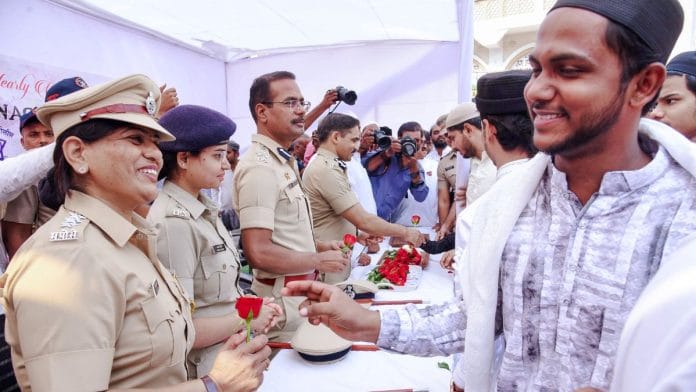Eid and the Waqf Amendment Bill 2024. These two events have ensured that Muslims, who represent about 18.5 per cent of India’s population, have received more than 85 per cent of the coverage on television news channels in the last three days.
On Wednesday, it reached a saturation point with live coverage of the debate on the Waqf Bill in the Lok Sabha throughout the day, followed by studio debates on the Lok Sabha debate all evening and into the night.
On Monday, coverage of Eid and the Waqf Bill began early in the morning and carried on into prime time. On Tuesday, the channels “simmered” and “boiled”, to use their own words, in the build-up to Wednesday’s debate.
The coverage itself was confusing. TV news gave you the impression that there were widespread and violent protests on Eid across northern India. Especially on Hindi channels, the focus was on protests and violence during the celebrations.
Meanwhile, leading English newspapers and websites barely touched upon either on Monday or Tuesday. You would have had to read with a magnifying glass to find any mention of these in the Delhi editions of The Times of India, Hindustan Times, The Indian Express. The Hindu story, “Eid prayers held under enhanced security in UP”, referred to a few trouble spots in Uttar Pradesh, but that was that.
This was far too bland for news channels, so they went looking for trouble wherever they could find it and suddenly a blip on the radar became a “bawaal” (ruckus). Channels such as Aaj Tak, India TV, Times Now Navbharat, Republic Bharat, TV 9 Bharatvarsh, Zee News returned repeatedly to Moradabad, where Muslims or “namazis” as news anchors chose to call them, were on the streets—“Moradabad mein hungama,” said TNNB. For good measure, the channel added, “Shahar-shahar mein hungama” (furore across cities).
ABP News told us that there were arguments with the police regarding delays in reaching the Idgah on time for namaz. NDTV India added that a second namaz had been arranged after a “halki si” (small) argument. No `hungama’.
Throughout Monday, we watched coverage of Eid ‘hungama’ or ‘bawaal’—from Mumbai in Maharashtra and Tonk in Rajasthan to Meerut and Saharanpur in UP. In Tonk and Bihar’s Darbhanga, “Muslim mob open instigation caught on camera, call to protest against Hindu festival. This is brazen provocation caught on camera…” said Republic TV.
The reporter at Zee News tried his best to find “provocation” in Malad, but he was surrounded by Muslims who told him “nothing has happened”— “pyaar, mohabbat se jaao…” (keep the peace and leave) and shooed him away.
India TV’s anchor was impressed by the Muslims “jumping” up and down and protesting against the Waqf Bill in Tonk. So too in Bhopal—all channels went to the Madhesh Pradesh capital to display the black bands and protest signboards against the Wafq bill and in support of Palestine. TV screens were split into 6 or 8 boxes for show us protests and violence….
And so it went on and on all Monday: But wait on, authorities like the UP Director-General of Police Prashant Kumar said Eid had passed off peacefully.
Some channels, such as Total TV, ABP News agreed, but their voices were drowned out, and we saw very little of the ‘peaceful’ celebrations. See for yourself what happened on TV and two contrasting versions of Eid celebrations on India TV and ABP News.
Also read: TV news was incensed at Ranveer Allahbadia’s ‘cringe’ remark—only to telecast it ad nauseam
An impending ‘war’
Protests against the Waqf Bill on Eid made good television imagery.
So did Yogi Adityanath, who in an interview with PTI, spoke about both. He questioned the current Waqf Board’s steps to benefit Muslims and advised Muslims to learn from Hindus in public expressions of their faith. For this, he referred to the Mahakumbh, not once mentioning the stampedes, deaths or the inconvenience on the streets to millions of commuters in Prayagraj throughout the Mahakumbh.
TV news also criticised Muslims for wanting to hold namaz on streets when it had been prohibited- “Cops v/s Namazis” said India Today.
By Tuesday, it was a “Showdown”, folks, on the Waqf Bill (CNN News 18). Led by Union Law Minister Kiren Rijiju, we heard leaders from most parties for and against the bill.
Channels interviewed Muslims who supported and opposed it. The usual sensational headlines accompanied the build-up to the debate in the Lok Sabha—with ‘war’ being the most common description.
Also read: ‘Aurangzeb’s gang’—how TV news made a bad Nagpur situation worse with sensational coverage
Listening to our MPs
The debate itself was a relief—at least the parts telecast live by news channels. Unfortunately, most of the debate was ignored – only ministers or important MPs were seen on television news—to watch others, go to Sansad TV.
Still, there were some plus points: Unlike other debates, such as the one on the President’s Address, MPs were allowed to speak without interruption or sloganeering while they spoke. Walkouts happened only when members wanted to excuse themselves, and MPs were seen listening in rapt attention to each other.
This is a crucial bill, so it was important for the audience to be able to listen in. Television news channels don’t telecast either Lok Sabha or Rajya Sabha proceedings while Parliament is in session, so this was a welcome change.
Why do news channels ignore Parliament unless a minister speaks or there’s a controversy? Perhaps because Opposition members would receive more coverage while questioning the government or speaking on issues.
But Sansad TV, which telecasts parliamentary proceedings, does its best to ignore the Opposition benches and to focus on the Speaker or ruling party members, so this shouldn’t be a problem.
Whatever the reason, here’s the thing: unless you devote all day to watching Sansad TV, you won’t ever get to hear what our MPs say in either house.
The author tweets @shailajabajpai. Views are personal.
(Edited by Theres Sudeep)






